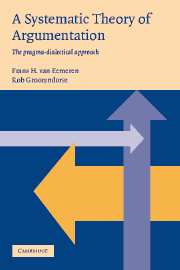8 - A code of conduct for reasonable discussants
Published online by Cambridge University Press: 12 January 2010
Summary
Characteristics of reasonable discussants
The pragma-dialectical rules for a critical discussion presented in Chapter 6 combine to form a discussion procedure that indicates which norms the speech acts performed by either of the parties in a difference of opinion must satisfy in order to contribute to the resolution of the difference of opinion. In our view, a theory of argumentation must, first, formulate a discussion procedure that provides a general survey of the rules for implementing the norms that constitute the “first-order” conditions for conducting a critical discussion. These rules are to be considered as the rules that are to be followed in order to play the game effectively, and they are to be judged for their capacity to serve this purpose well – their problem-validity. In order for the rules to be of any practical significance, however, there also must be potential discussants who are prepared to play the game by these rules, because they accept them intersubjectively – so that the rules acquire conventional validity as well. In practice, argumentation theorists cannot go much further than to propose the rules and defend their acceptability.
Our claim that the pragma-dialectical discussion rules will in principle be acceptable to discussants who want to resolve their differences of opinion in a reasonable way is based, first, on the effectiveness of the rules.
Information
- Type
- Chapter
- Information
- A Systematic Theory of ArgumentationThe pragma-dialectical approach, pp. 187 - 196Publisher: Cambridge University PressPrint publication year: 2003
Accessibility standard: Unknown
Why this information is here
This section outlines the accessibility features of this content - including support for screen readers, full keyboard navigation and high-contrast display options. This may not be relevant for you.Accessibility Information
- 1
- Cited by
